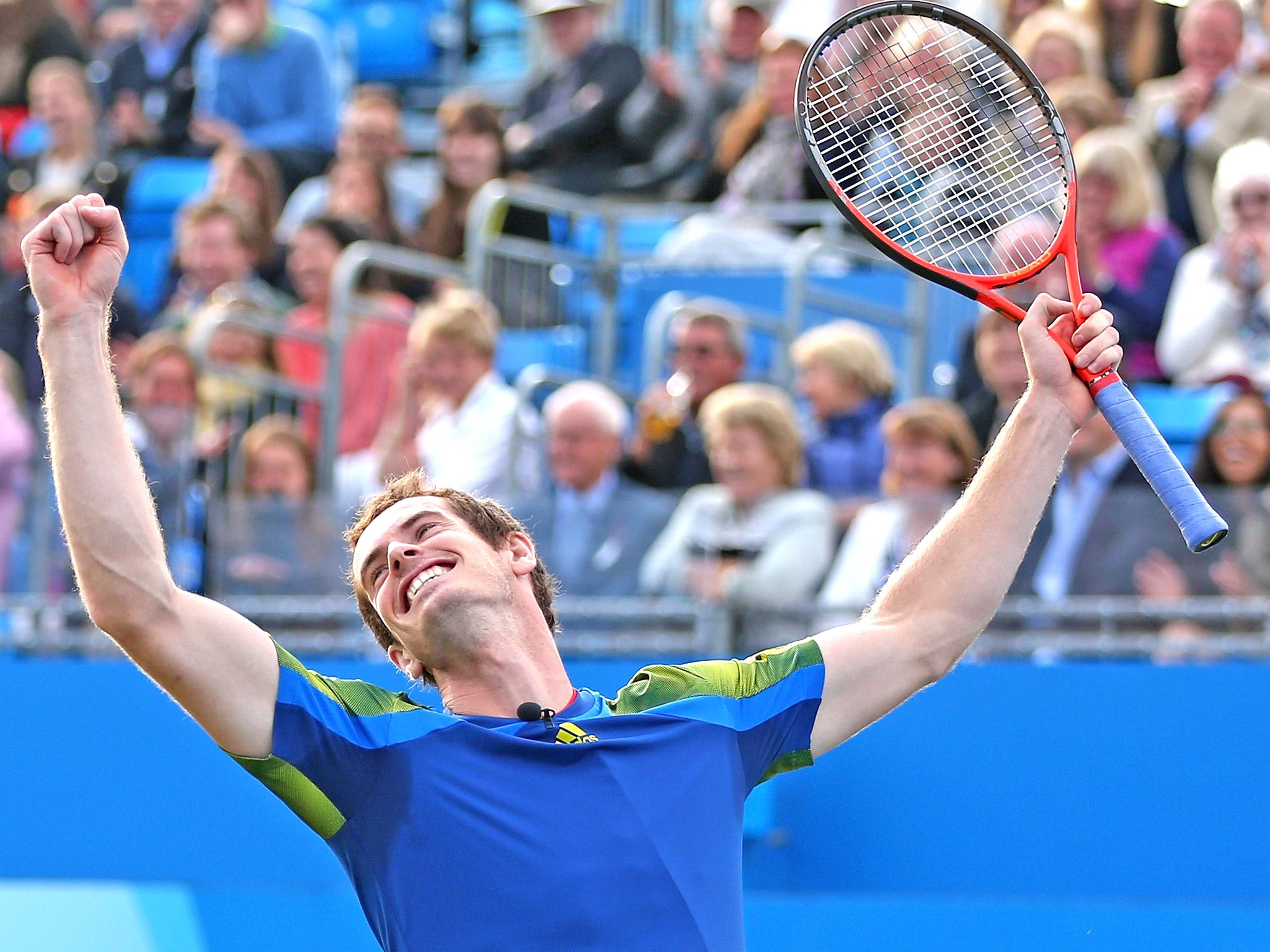Sunny new outlook can help Andy Murray win more than just titles, says John McEnroe

If John McEnroe had been watching Andy Murray at Queen's Club on Sunday he would surely have approved. The quality of the Scot's tennis as he won the Aegon Championships title for a third time was hardly a surprise, but McEnroe would have loved the emotion Murray showed afterwards: the kisses he blew to his cancer-stricken friend, Ross Hutchins, and his jig of delight in the ensuing charity doubles match after he had finally given Ivan Lendl, his coach, a dose of his own medicine by drilling a half-volley into his body.
McEnroe played in an era when the top players – apart from the ice man himself, Bjorn Borg – were never reluctant to show their emotions on court, whether they were snarling at their opponents across the net, bawling at umpires or celebrating extravagantly after a winning shot. Despite the brilliance of Roger Federer, Rafael Nadal, Novak Djokovic and Murray, McEnroe believes that the modern game would have even more appeal to the public if players were more inclined to let their passions loose on court.
"In some ways, it was a unique time in the sport when I was coming up," McEnroe said. "There just seemed to be a lot of people that had personality. Personality was almost as important as how good you are. It's a big plus if we can get more of that."
While Murray has never been one to hide his emotions during matches, it used to be the negative side that came to the surface, whether he was shouting in the direction of his entourage, scowling on the baseline or having a rant at nobody in particular. McEnroe likes the fact that Murray has shown less negativity on the court since he started working with Lendl but believes he could still show more positive energy.
"It's one thing if you turn negative emotion into better playing," McEnroe said, the American having been a past master at doing exactly that. "It's another if you express negativity and your level of play drops. It was pretty clear that was happening with him.
"Murray's first step was the right one: try to clean up that part and get away from that, not being so negative. That has helped him. He does probably, I suspect, need a way to express himself and get some of this stuff out. If he could do it and be more positive about it, that would be incredible.
"I can see from the outside that would help us as a sport. When the crowd started to really get behind Murray at the Olympics, that made a big difference. In a way it sort of bothered and annoyed Federer [in the final] because as far as I know he had never experienced people actually being against him. That benefited Murray. At first he wasn't doing a whole lot. But eventually he pumped his fist and jumped around a bit. Personally, that was great to see. When you win an Olympic gold medal, you want people to jump for joy. And I do think it helped him to win the US Open."
McEnroe, who will again be a member of the BBC's commentary team at Wimbledon from next week, has been concerned that television ratings for tennis in the United States have dipped and believes having players show more lust for life and for competition would broaden the sport's appeal. Federer did so when he cried in public following his loss to Nadal in the Australian Open final in 2009, while Murray's tears after losing to the Swiss in last year's Wimbledon final proved a turning point in the Scot's popularity with the British public.
"Federer cried and all of a sudden this is like major news, because you don't see much of anything else," McEnroe said. "When Murray did it, it was sort of the same thing. People could relate to him as a human being a lot more easily. I don't suggest that we should start crying all the time but I come from that school."
As for this year's Wimbledon, McEnroe believes that Murray will benefit from his experience of losing last year's final. The American recalled the way he benefited fromhis defeat to Borg in his first Wimbledon final in 1980. Twelve months later the two men met again in the final at the All England Club – and this time McEnroe won. The American said the benefit of the previous year's experience had been "huge".
In 1980, Borg had had the easier passage and that told in the final, which went to five sets. "I won the first set and had a great opportunity to win the second and didn't," he said. "All of a sudden it became this great uphill battle. It definitely made me want it more, no doubt about it. Murray has already had some of those experiences, including last year's final, where he played well and had a great opportunity to get a two-sets lead." McEnroe added: "This is the type of thing that Murray, if he's going to win a handful of majors and not just one, he's got to learn."
John McEnroe commentates at Wimbledon for BBC TV and presents the '6-love-6' tennis phone-in on Radio 5 live. Full coverage of the Championships on BBC TV, radio and online
Subscribe to Independent Premium to bookmark this article
Want to bookmark your favourite articles and stories to read or reference later? Start your Independent Premium subscription today.

Join our commenting forum
Join thought-provoking conversations, follow other Independent readers and see their replies